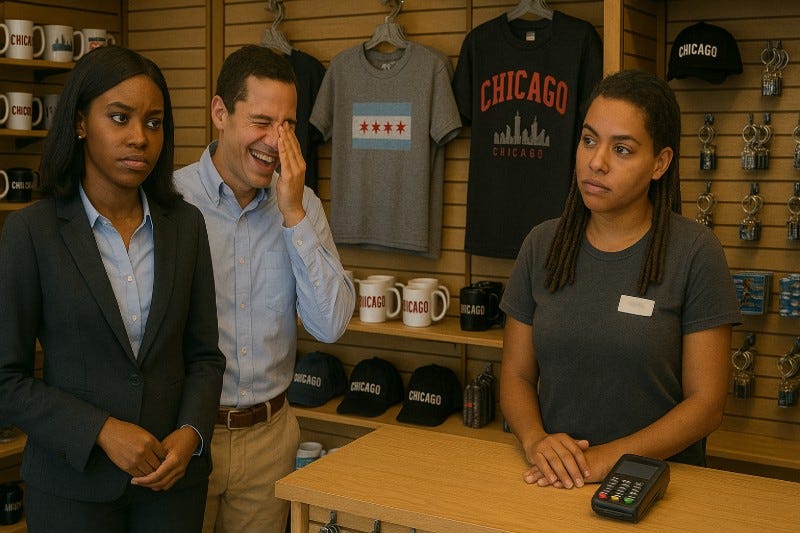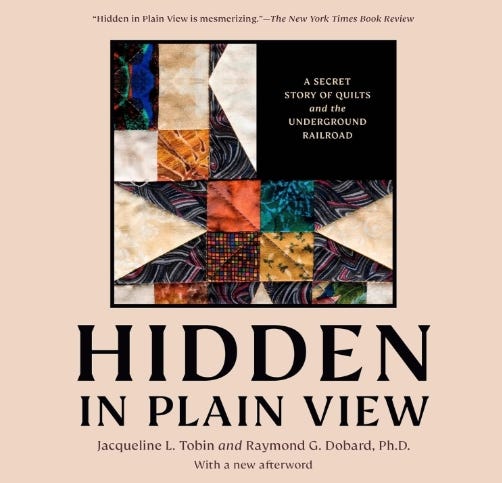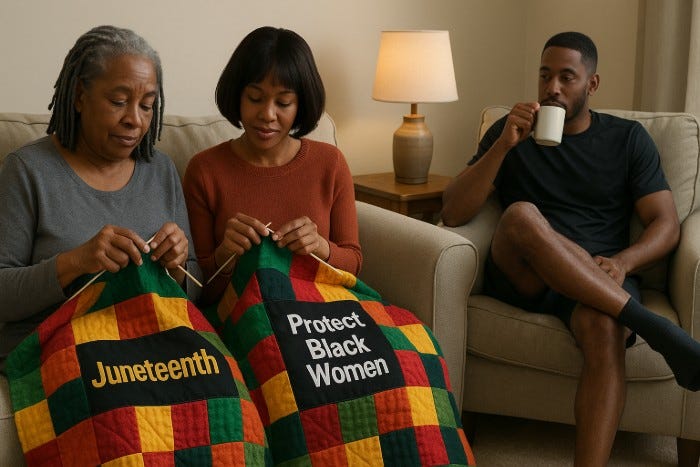My take on the debate about quilt coding on Juneteenth
With language and culture stripped from enslaved people, why it is so hard to believe the Underground Railroad included coded quilts?
“Hey, you have to pay for that first,” I heard my (then) coworker yell out in the middle of a souvenir shop.
I was a few feet from the exit door when I heard him say this, and I froze. I looked back at my coworker and once again remembered this was definitely not a man who grew up in a Black household. Half Jamaican and half white, he immediately started laughing. It was the sort of thing I could only assume would be comical to his FOX-News loyalist stepfather, who he’d grown up with.
ADVERTISEMENT ~ Amazon
As an Amazon affiliate, I earn a percentage from purchases with my referral links. I know some consumers are choosing to boycott Amazon for its DEI removal. However, after thinking about this thoroughly, I choose to continue promoting intriguing products from small businesses, women-owned businesses and (specifically) Black-owned businesses who still feature their items on Amazon. All five of my Substack publications now include a MINIMUM of one product sold by a Black-owned business. (I have visited the seller’s official site, not just the Amazon Black-owned logo, to verify this.) If you still choose to boycott, I 100% respect that decision.
I turned to the Black woman cashier at the register, and we exchanged glances. His “joke” was equally uncomfortable for her because she didn’t know who was lying. And as a former cashier, there are few things that make me cringe quite like having to confirm whether Black customers are stealing. To make matters worse, he repeated the accusation a second time.
With empty hands and no purse, I couldn’t immediately give her something to check to ease her mind. But the fact that he kept on laughing apparently made her realize this was a joke. When the two of us left that store, I gave him a piece of my mind about how Black people get racially profiled all the time in stores. So, what was making him laugh could be traumatic for some. The look on his face was like I was being overly dramatic.
I’d never had to explain to anybody Black why we don’t play those types of games. We just know it through lived experience. It’s an unspoken rule, along with a zillion others. The cashier and I never said a word to each other, but we had a whole conversation with just our eyes.
ADVERTISEMENT ~ Amazon
As an Amazon affiliate, I earn a percentage for each sale made with my referral links on this page.

You're decades late on slang and using it all wrong
I wince at the Jimmy Johns commercial with an actor (Adam Pally) calling women “queen.” Even Burger King could have gotten away with it better than it being used at this Trump-supporting sandwich place. (I think I heard “queen” from every other Black man I knew during the “Love Jones” and “Def Poets” era. I randomly hear it now from somebody who could definitely hang with Darius Lovehall.)
I also sigh the deepest of sighs when someone calls any kind of dance “twerking” — or gives all credit to Miley Cyrus as though 2 Live Crew and Sir Mix-a-Lot are a figment of my imagination. (That episode of “Scandal” when Quinn Perkins said First Lady Mellie Grant was “twerking” drove me crazy. What she was doing was more like the Robot — and a really bad Robot at that. Fried Chicken Mellie was laugh-out-loud comedy though.)
Then there are those who haven't seen Laurence Fishburne screaming at the end of “School Daze” but start lecturing people about “being woke.”
Please stop. It always sounds like the “How do you do, fellow kids” guy.
When you’re of a culture — any culture, not just Black — there are things that you just know. You don’t know when you learned them. You just know how to use the term correctly, and it sounds more natural.
ADVERTISEMENT ~ Amazon
As an Amazon affiliate, I earn a percentage for each sale made with my referral links on this page.
Then there's the quilt code debate
Visual conversations. Cultural conversations. Conversations through music. All three of these methods of communication popped into my head while reading the recent debate regarding whether runaway enslaved people in the South used encoded messages in quilts to communicate in the Underground Railroad. Authors of the book “Hidden in Plain View: A Secret Story of Quilts and the Underground Railroad” (by Jacqueline L. Tobin, Raymond G. Dobard, Maude S. Wahlman) decoded 10 patterns that make up the Underground Railroad Quilt Codes.
But other scholars, white and Black, are skeptical of this history lesson that wasn’t widely publicized until 1999 when the book released. This is yet another instance where there’s a communication divide.
We’re talking about people who didn’t even know their own birthdays, including Frederick Douglass, who chose the one day in February when his mother gave him heart-shaped cakes.
In the case of the quilts that have become an unofficial Juneteenth tradition, I’m torn. Both groups make solid points about the validity of the quilt coding, but I’m of the mindset here that I was in the souvenir shop: “If you know, you know. Oral history and lived experience aren’t always written down.”








